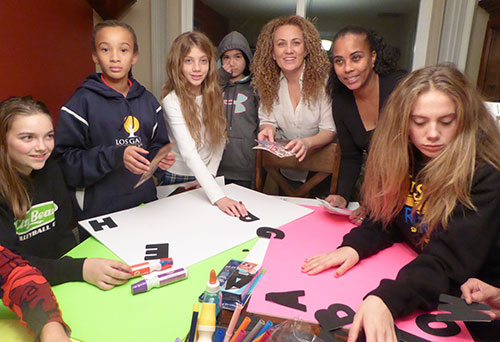

A diverse group of about 20 Santa Clara women and their daughters were among the estimated 25,000 who marched into history in downtown San Jose Jan. 21. They marched in solidarity with the grassroots Women’s March on Washington, D.C., where an estimated half a million marched to advocate human rights, civil liberties and social justice for all.
The San Jose march, as well as those in Oakland and San Francisco, was organized by the nonpartisan, all-volunteer Women’s March Bay Area. About 11 a.m., San Jose marchers began the .7-mile walk from City Hall to Plaza de César Chávez. Walking 20 abreast, it took over two hours for the mass of marchers to reach the plaza, where an afternoon rally scheduled until 3 p.m. featured 11 speakers, including San Jose councilmembers and human rights activists.
The small group of Santa Clara friends that marched included stay-at-home moms, small business owners, deans and private sector employees. They had gathered the night before at the home of Gillian Thorp for a sign-making party co-hosted by Thorp and her friend Tia Williams.
“We care about women’s rights–women’s rights are human rights. And we care about the direction our country is going,” said Williams. “We each have two girls, and we’re concerned for the future of our daughters.”
“We want to model civil engagement and show strong successful women coming together in solidarity. We are in solidarity with women around the world,” said Williams.
“I want my daughters to see that they can affect their future,” said Emma Slade, a San Jose resident.
“I’ve never been in a political march before,” said Susan Peters. “I feel very strongly that we need to come together to stand up for the rights of every group. I have personal friends who are scared about their future. Coming together as a group and showing our support as all Americans is important, whether immigrants, people of color or LGBT.”
Nora Clark, an American citizen, was born in El Salvador.
“I’ve always been politically correct and not talked politics,” said Clark. “But being an immigrant, it’s important to me to let my friends know that immigration is a healthy part of this country and that people are not coming here to take advantage of the system. People are coming here to work hard and make this a better country.”
Thorp, a biracial–half black and half white–woman who was born in South Africa, grew up under the apartheid system.
“We came to the U.S. because this is the land of hope and opportunity,” said Thorp, now a U.S. citizen. She had considered traveling to Washington, D.C., to march but decided, instead, to organize and walk at home.
“It’s important to remain in my hometown and influence my political representatives here. I prefer to be here, where I pay my taxes,” said Thorp.
Friday night, the mothers and daughters were brainstorming slogans then writing them on posters. “All women are 10s,” “I’m walking for my daughter,” “Women’s Lives Matter,” “Our rights are not up for grabs and neither are we,” “Normalize love not hate,” read some of the signs.
“I’m super excited,” said Kiara Thorp, a freshman at Santa Clara High School, where she is a reporter for the school newspaper, The Roar. “My editor told me I could interview people at the walk and do a story on the protest. It’s important for me to walk for all the reasons on the posters.”
Eleven-year-old Nicki Thorp, a student at St. Justin School, painted “I am a girl and I am proud” on the pink T-shirt she wore for her march into history.
“It’s fun to be part of a protest because you to get to stand up for your own rights,” said Nicki. “You have a voice and can say what you want to say.”
After marching Saturday, Thorp reflected on the experience, stating, “Today was truly an extraordinary day. It was so wonderful being surrounded by such positive energy and incredibly amazing to see so many families and children peacefully marching….
“What I took away from today’s march is that this is the beginning of a movement, not a one-time gathering. As I talked to people out there, the common theme was that women are committed and ready to take on the fight ahead of us–a refusal to go back in time. It was beautiful to have my daughters be a part of this historic march and witness a diverse group of people modeling peaceful and positive behavior and speech….”
“Maya Gurantz: The Plague Archives,” at the de Saisset Museum on the campus of Santa…
Two people suspected in multiple bank robberies throughout the Bay Area pleaded guilty to the…
A group of crooks that rammed a local jewelry store with a stolen car absconded…
Sports and infrastructure will be Santa Clara’s focus over the next year. At the Santa…
With the World Cup and Super Bowl coming to Santa Clara’s Levi’s Stadium next year,…
Rest vs rust; it’s a classic sports debate. When there is a break in the…